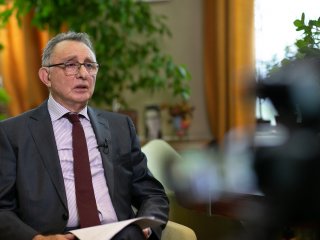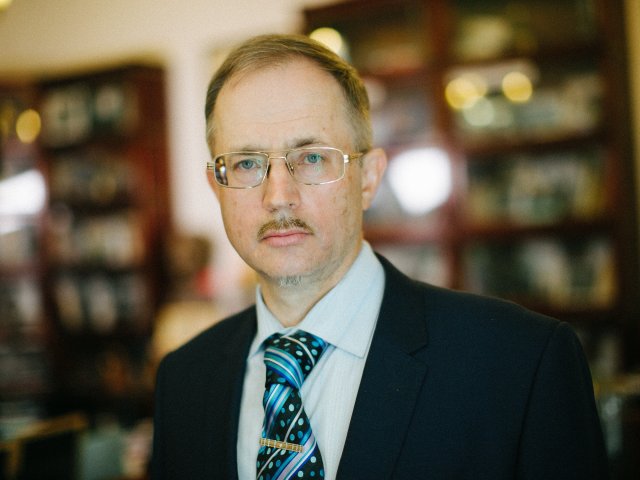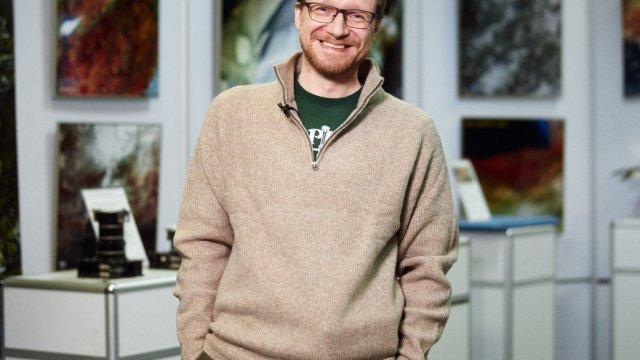We live in the period of real biological threats. Where will they come from and how to prevent them? Does biological terrorism exist? Was the present coronavirus let out of laboratory?
This topic is highlighted by Sergey Kiriakovich Zavriyev, RAS correspondent member, professor, head of two departments at the Bio-Organic Chemistry Institute of RAS – the ones of international scientific relations and molecular biology and biotechnology of plants.
Besides, our interlocutor works at the Center of International Security under the Primakov Institute of World Economy and International Relations dealing with the analysis of problems related to biosecurity there.
– Sergey Kiriakovich, I would like to recall your outstanding father, a remarkable scientist. What did he study, and what did you inherit from him along with the name?
– Almost nothing, as far as my profession is concerned. My father was the founder of the Academy of Sciences of Georgia – we are the natives of Georgia – academician of architecture and construction of the USSR, outstanding engineer, seismologist dealing with earthquake-proof construction, and a member of some international societies and associations.
– It appears that he also dealt with security issues, doesn’t it?
– Yes, in some sense. He designed the concrete earthquake-proof belts making buildings resistant to earthquake. He taught a lot and had many disciples who admired and respected him. He was a brilliant lecturer and took care of the youth. A remarkable person indeed!
– Why did you choose biology?
– At that time, physics, biology and biophysics were in fashion, so I entered the physical faculty. Biophysics is indicated in the profession graph of my diploma. I am a candidate of physics and mathematics specializing in biophysics and doctor of biology specializing in molecular biology.
– Over the recent year, you have studied biological security and bioterrorism, the topic that are very relevant today with regard to coronavirus threat. How it all began?
– At first, it was my research hobby. Then, I felt the danger and importance of this problem and started taking active interest in these issues in early 2000s. With time, I established cooperation with academician Arbatov from the Primakov Institute, and serious work began. I have published a number of papers with analysis of publicly available data related to the problems of biosecurity.
– In connection with COVID-19, people talk a lot about the possibility of making viruses in a garage or some amateur laboratory and spreading them among human population. There was nothing of the kind some 20 years ago, wasn’t there? How did you guess that this problem would be relevant?
– I would like to say that working and studying such viruses in the conditions of some garage or primitive laboratory is impossible. Such a specialist will become the first, yet not the last victim of their studies. As for the relevance of the said problem, many suspected it. The thing probably is that I have always studied viruses, bacteriophages. The idea of their possible use as a weapon came to my mind spontaneously so to say. Moreover, the problems of this type were mentioned regularly enough in publicly available information sources. Thus, it looked obvious for many virologists, epidemiologists and other specialists. We know from the history of mankind that some epidemic – plague, smallpox, cholera – would break out approximately once in every 100 years. For instance, the outbreak of Spanish influenza took place in early past century. Dozens of millions of people died. Just imagine what would have happened, if there had been developed transport infrastructure at that time that allowed for taking a flight and arriving in Singapore, Brazil or any other distant corner of the world. The consequences of the Spanish influenza epidemic would have been even more terrible in this case. The modern transport infrastructure allows for spreading a dangerous pathogen all over the world within one or two weeks and infecting a major part of mankind, and the present pandemic can serve as the evidence of it. If the pandemic that we have today had been a deliberate and well-thought-out action, we might have failed to talk today. Naturally, the Spanish influenza was spreading on its own, without any malicious intent on somebody’s part, yet it still claimed a terrible number of lives. If the epidemic, as pathogenic a Spanish influenza broke out today, the consequences would have been much more terrible. That is why the analysis and conclusions made as to the outbreaks of infections, even the ones of much lower profile, are very relevant and important today.
– What does the problem of biological terrorism look like today? Does it exist already, or do we just try to foresee and prevent it?
– There are no clear and evidence-proven facts of deliberate spreading infection by some biological terrorists, when someone takes a pathogenic virus or other microorganism from the laboratory and deliberately spreads it.
As far as the present coronavirus is concerned, it started spreading, in my point of view, either in a natural way being transmitted from the animal to people, or as a result of accidental leakage from the laboratory, highly likely the one in Wuhan. Yet, there is no information proving that someone has spread it deliberately, i.e., organized a terrorist act.
Everything related to the present pandemic is debated so widely, in detail and unfortunately often very unprofessionally that it makes no sense elaborating on this topic in the context with our present conversation. The cases of spillage from the laboratory are not new, they have happened even in Russia. We know about such a spillage near Sverdlovsk in 1978, when a virus of smallpox got into the environment due to someone’s negligence. There were leaks of SARS, tularemia, Ebola virus and influenza in different countries of the world, including Singapore, Taiwan, China, and the USA.
– Yet, they also pose a threat, don’t they?
– They obviously pose serious danger, yet have nothing to do with terrorism. It is just somebody’s negligence or concourse of circumstances. Thanks God, all these outbreaks were localized very quickly and efficiently. A far as I know, these incidents resulted in no serious consequences. Terrorism is potentially much more hazardous by definition and may lead to much more grievous consequences.
Another problem, also very important and discussed very actively since early 21st century, deal with agroterrorism and agrobioterrorism. It is clear that the consequences of acts targeted at human health are absolutely obvious, terrible and catastrophic. But if we look at the agricultural sector, just imagine what will happen if the fields of wheat, rice, corn and other vital agricultural crops are infected with a strong, quarantine pathogen! What about infecting cattle stock, pigs, poultry, etc. with dangerous pathogens? All of them will die, and it will be a catastrophe for the mankind, do you understand?!
The trouble is that it is easier to commit such deliberate act of terrorism with the help of pathogens if compared to the ones targeted at human life and health. It is because the malefactor themselves will not get infected with what they infect corn, cattle or any other agricultural object. This very type of terrorism I much closer to the garage system of biological weapon production that you have mentioned.
– What do you think can be done in this respect?
– The Biological and Toxin Weapons Convention (BTWC) is very important today, and above all its upgrade and compliance with it by all countries signing the document. By the present day, 181 countries have signed BTWC. However, one should understand that it is hard to comply with it and control the compliance. The compliance with the document is easy for the countries having no science of their own. These are small and poor countries with undeveloped science.
The situation is not so easy for developed countries. I do not even mention deliberate creation of closed laboratories, though there are such. In this case, some risk of leak always exists. Besides, it is hard to verify the activity of such laboratory under BTWC. WHO experts visited Wuhan, examined the said laboratory, but, as far as I know, found nothing suspicious. No specific and clear conclusions have been presented. The same is true for BTWC. It is almost impossible or very hard to control all countries, all hazards, as well as potential possibilities of deliberate use or development of some extremely dangerous substance.
Naturally, these issues are preliminary discussed during the preparation to the next BTWC conference: what experts should be chosen, where and how should they be admitted to. However, it constitutes a serious problem so far.
– Nevertheless, the problem must be solved somehow. What are your suggestions with regard to building this structure?
– One can make many suggestions, as well as invent and organize a lot of structures. The main thing I that they should be implementable. Mutual trust and harsh discipline are required. If we manage to introduce such discipline as we have seen in China during the pandemic, the mechanism will work. They now close vast territories even if two people get infected, and nobody growls about it. Everybody obeys. If such a pattern is implemented on a global level, we will manage to avoid the terrible consequences of pandemic.
I had an idea and highlighted it back during the preliminary discussion of the coming BTWC conference. It is about creating a worldwide center for working out various platforms for development of vaccines. No matter what vaccine we will need and what pathogen it will be intended for – the platforms will be ready. It will be easy enough to choose the optimal ones and create a required vaccine on their basis. Like it was at the Gamalei Institute – the platform on the basis of adenovirus was ready, and it was used for the creation of Sputnik V. The mass production of vaccines may be delegated to certified centers all over the world.
– It is obviously a sound idea, yet it deals with the present epidemic. What can be undertaken to avoid epidemics at all?
– It is not exactly this way. My idea suggests enhancing the efficiency of quick response to possible outbreaks of new infections. As for the prevention of leakages, we need a good and very reliable security system in the laboratories having these viruses. At the same time, it is very hard to prevent the virus from getting to the organism of a person from some animal that lives near them.
– Suppose this virus has really got into animal population and later human organism from Wuhan laboratory. What might it be produced for? What was the purpose of it? What do you think?
– This question should probably be set to those working with the virus. In general, viruses are studied with regard to their genetics, mutations and functions of individual genes. These issues are studied with respect to understanding their interaction with the cells of organisms that these viruses infect, as well as the ways for liquidating or minimizing the consequences of damage to the human, animal or plant organism. Put it shortly, scholars produce viruses to look how they work.
– Well, they did look indeed.
– I think that they did not want such a turn of events. However, it happened as it happened, unfortunately. I hope the scholars will make the respective conclusions, while the people will understand the importance of it. It is not by chance that President Putin said about uniting the whole planet together for the purpose of defeating the pandemic.
– The idea of uniting is not working out judging by the number of vaccinated people.
– You are right. Politics and economics have a finger in it. Why don’t they recognize our Sputnik in Europe, except for several countries? It must be financially inefficient. The companies producing the American and European vaccines want to make more money on them.
– The process is slow in Russia, though the vaccine is available in the majority of regions. Where does the distrust come from?
– It is hard for me to comment. It is not distrust, but Russian faith in sheer luck in the majority of cases. However, there are some conspiracy theories and legends about vaccination. In a word, each in their own way. Such sentiments are popular enough in the society. We have no involuntary vaccination so far. It is obvious and personal responsibility ought to be raised.
– How can it be done?
– I am sure that patient and clear explanation is required. There was public health education once. We should revive it.
– Did you get vaccinated?
– I got vaccinated with Sputnik. I have a certificate in Russian and English. However, it is unfortunately not valid outside our country so far, as it is not recognized abroad. There are just several countries you may enter with this certificate. These are mostly the ones living at the expense of tourism.
– Again, economic interests instead of medical or biological one.
– It is natural. Everybody wants to survive.
– What other biological security measures do you consider efficient?
– We should work out new highly efficient vaccines for both human and animals, vaccinate cattle, create antidotes for poultry, etc. Environment ought to be protected. Ecologists call for avoiding forest fires, nature contamination, throwing plastic bottles into water, and oil spills. However, ecological safety also depends upon the pathogens that exit in nature.
For instance, an outbreak of aphtha that affects cattle took place in Britain in 2001. Tremendous quantities of cattle died. Economic damages were estimated at hundreds of millions of US dollars. It was a real catastrophe. The same was true for avian flu epidemic in California in early 2000s. These factors ought to be taken into account.
Many pathogens including the ones of plants, viruses in particular, can be transmitted to long distances. Birds, insects and wind disperse them. Is it clear? Besides, we see global warming. Russia can boast of favorable conditions in this respect, so to speak. We have many territories that are not used for farming due to inappropriate climate. However, these lands will become arable afterwards from the global point of view and be of help to the mankind. On the other hand, the global warming leads to new hardly predictable threats, including biological ones.
– Is it true that one can purchase a certain set of equipment and substances on the Internet today and make a virus in the kitchen?
– Unfortunately, it is partially true. Such things become increasingly more available, and we must learn how to control it on the state and even international level. Otherwise, it will be hard to avoid trouble. It is the reverse side of scientific development. The access to technologies become easier, and they often come into the hands of irresponsible people or criminals.
At the same time, it is impossible to stop scientific development, while control over it is increasingly more difficult. Nobody knows what it may lead to. When they discovered x-ray radiation, nobody expected it to be dangerous. Moreover, they turned to be useful. Nobel became rich as the inventor of dynamite, an explosive, not to mention the creators of atomic bomb. This bomb is capable of destroying half of the planet, yet atom may be peaceful as well. We know the benefits for mankind that peaceful atom brings.
It is true for viruses as well. The upgrade and development of genetic investigations, including the ones in the field of virology, are certainly required, yet we must not use their achievements for illegal purposes, including the ones dealing with creation of biological weapons. The same is true for synthetic biology, gene engineering and other sciences. We must learn to exercise reasonable control over these processes. It is a top priority task for both individual states and world scientific community in general.
Sergey Kiriakovich Zavriyev, RAS correspondent member, professor, head of department for international relations, head of department for molecular biology and biotechnology of plants at the Bio-Organic Chemistry Institute of RAS

































